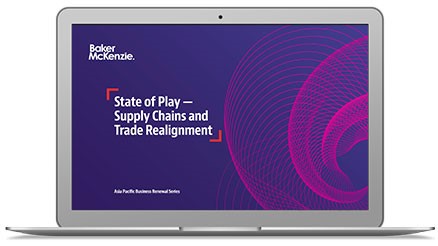21 May 2021
• Asia Pacific business leader survey finds trade disputes and protectionism top list of concerns
• Increasing protectionism also top risk where legal support needed
• Almost all respondents had altered their investment strategies based on shifting foreign investment restrictions
Part of a new report – State of Play: Supply Chains and Trade Realignment – the survey also reveals the vast majority of businesses are either on-shoring (46%), near-shoring (78%), insourcing (67%), seeking out new geographies (73%) or a combination of these activities. Collectively, this equals a huge realignment of global supply chains, as companies with operations in Asia Pacific seek to de-risk their sources of supply, and geopolitical and regulatory risks overtake cost as a key determining factor.
At the same time, increasing foreign investment restrictions are also having a major impact on where companies are looking to locate production, with a full 97% of business leaders surveyed now redirecting their investments to jurisdictions with lower barriers to investment, or focusing primarily on domestic investment.
However, there remains immense legal and regulatory challenges to overcome to successfully transform supply chains in the Asia Pacific region.
As Cahyani Endahayu, Partner, HHP Law Firm (Baker McKenzie's member firm in Indonesia), points out:
"Despite the combined large population of countries in the region, the challenges for supply chain diversification, particularly in South East Asia, center on diversity of geographies, political conditions, legal certainties, ease of doing business and investment incentives for foreign investors. In general, due to the array of different business languages in the region, as well as the fact that individual countries do not operate as one single market or a single supply chain hub, the key challenge ahead is to streamline different legal and licensing requirements, and national standardization between countries.”
From a macroeconomic perspective, while overall the news is relatively positive, with more than half (58%) of respondents saying revenues will be back to 2019 levels by the end of 2021 — and 14% say they are already back in line with pre-pandemic sales volumes. However, across various industries, much starker differences are apparent. Business leaders in the technology, healthcare and consumer goods & retail industries see full recovery in the short-term. Conversely, industrial, transport and energy companies, among others, say they may struggle for the next two to three years before they see a return to growth.
In terms of where businesses in the region are looking for alternative sources of supply, interestingly Australia currently tops the list, in part possibly reflecting its success with managing Covid.
Anne Petterd, Head of International Commercial & Trade, Asia Pacific notes that there also remains some positive avenues to continue to develop trade ties, with almost two thirds (62%) of survey respondents reporting the Regional Comprehensive Economic Partnership (RCEP) will have a positive or very positive impact on their ease of doing business.
“Countries in the region have diverse geographies, cultures and economies. This means that the response by governments to rising protectionism and global trade tensions will vary. One way for the region to tackle these hurdles is to find common ground and collaborate. Initiatives like the Regional Comprehensive Economic Partnership (RCEP) which include mechanisms to tackle non-tariff barriers to trade can help to facilitate trade and mitigate some of the wider global risks,” she concludes.
For further information, please contact:
Anne Petterd, Partner, Baker & McKenzie
anne.petterd@bakermckenzie.com






